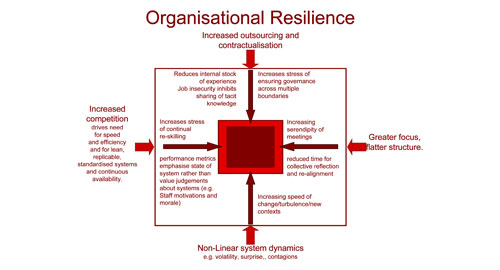
Organisational Risk
Global pressures have resulted in a growing focus on efficiency and streamlining
The result has been flatter organisations that are increasingly stretched to control and manage risks over multiple interfaces, driven by shorter timeframes and shortening timescales.
We have identified several key issues central to understanding organisational risk from our research, namely:
- How to achieve an adaptive yet efficient organisational culture able to manage complex risk environments?
- How to nurture and value tacit knowledge within the organisation?
- How to create a learning organisation with greater trust and reduced transaction costs?
Anticipating and understanding organisational risk within a specific context is critical for any organisation that wants to survive and thrive in a turbulent external environment. It requires a resilient organisational culture that can think strategically and then anticipate and adapt to change.
The examples of our work on organisational risk are confidential. In each case the focus has been on identifying the range of complex global risks that are likely to impact upon the organisation in question and to build a set of scenarios of the future, so increasing internal awareness of external volatility and encouraging a resilient organisational culture that can anticipate and adapt to change. This increases the likelihood of strategic rather than reactive tactical thinking.

Professor Frances Westley,
Professor of Strategy and Organisation, McGill University, RiskWorld interview

Related articles
Further reading
- Financial risk
- Technological risk
- Knowledge risk
- Health risk
- Environmental risk
- Societal risk
- Moral risk
Useful links




